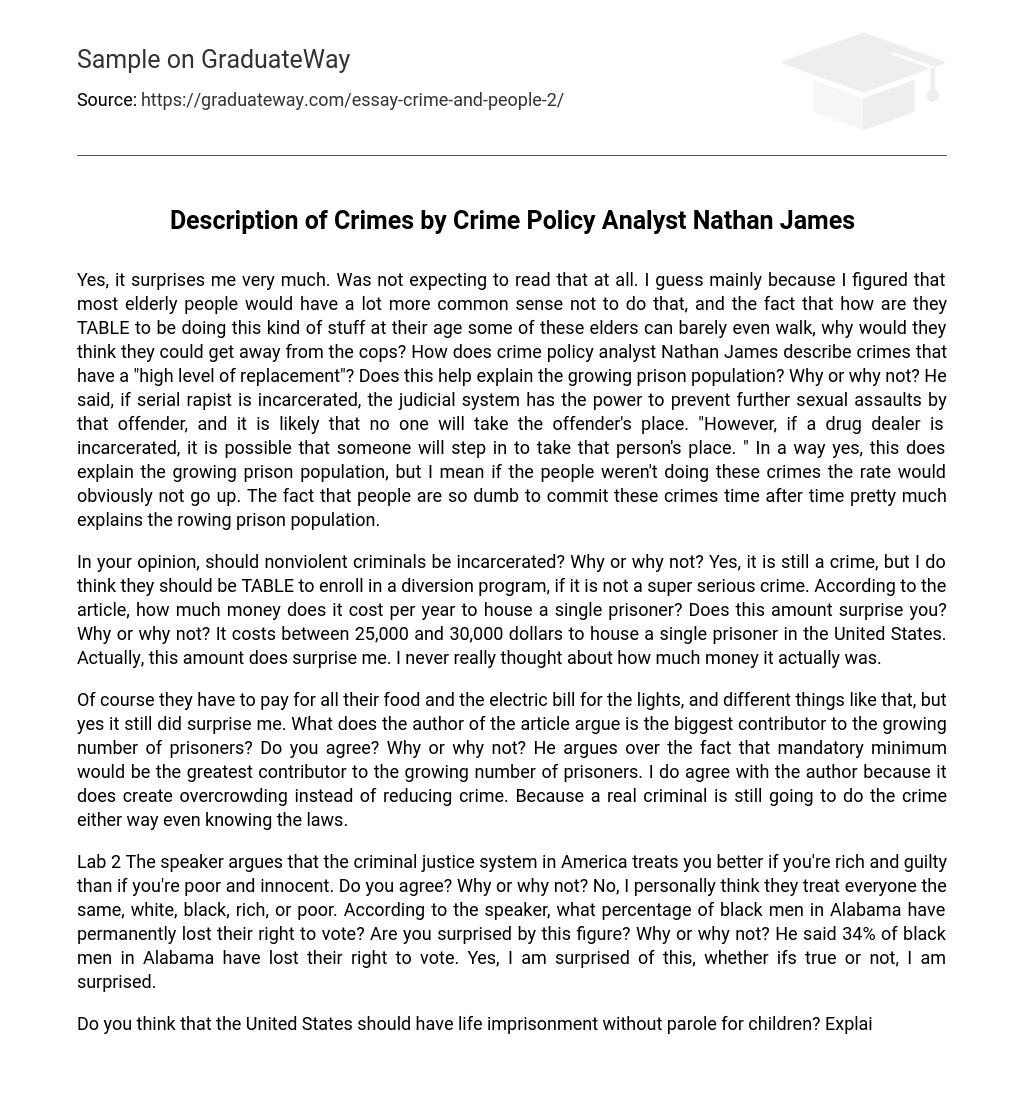Yes, it surprises me very much. Was not expecting to read that at all. I guess mainly because I figured that most elderly people would have a lot more common sense not to do that, and the fact that how are they TABLE to be doing this kind of stuff at their age some of these elders can barely even walk, why would they think they could get away from the cops? How does crime policy analyst Nathan James describe crimes that have a “high level of replacement”? Does this help explain the growing prison population? Why or why not? He said, if serial rapist is incarcerated, the judicial system has the power to prevent further sexual assaults by that offender, and it is likely that no one will take the offender’s place. “However, if a drug dealer is incarcerated, it is possible that someone will step in to take that person’s place. ” In a way yes, this does explain the growing prison population, but I mean if the people weren’t doing these crimes the rate would obviously not go up. The fact that people are so dumb to commit these crimes time after time pretty much explains the rowing prison population.
In your opinion, should nonviolent criminals be incarcerated? Why or why not? Yes, it is still a crime, but I do think they should be TABLE to enroll in a diversion program, if it is not a super serious crime. According to the article, how much money does it cost per year to house a single prisoner? Does this amount surprise you? Why or why not? It costs between 25,000 and 30,000 dollars to house a single prisoner in the United States. Actually, this amount does surprise me. I never really thought about how much money it actually was.
Of course they have to pay for all their food and the electric bill for the lights, and different things like that, but yes it still did surprise me. What does the author of the article argue is the biggest contributor to the growing number of prisoners? Do you agree? Why or why not? He argues over the fact that mandatory minimum would be the greatest contributor to the growing number of prisoners. I do agree with the author because it does create overcrowding instead of reducing crime. Because a real criminal is still going to do the crime either way even knowing the laws.
Lab 2 The speaker argues that the criminal justice system in America treats you better if you’re rich and guilty than if you’re poor and innocent. Do you agree? Why or why not? No, I personally think they treat everyone the same, white, black, rich, or poor. According to the speaker, what percentage of black men in Alabama have permanently lost their right to vote? Are you surprised by this figure? Why or why not? He said 34% of black men in Alabama have lost their right to vote. Yes, I am surprised of this, whether ifs true or not, I am surprised.
Do you think that the United States should have life imprisonment without parole for children? Explain. How does the speaker feel about this issue? No, I do not, I understand that they did something horrible, but kids sometimes go through hard struggles when they are young. Like their parents may get divorced or their parents might even die. Those kind of things cause kids to do bad stuff, but people change. They of course should put them in prison, but they should be TABLE to get parole. Well, the speaker didn’t really say how he felt about it, but I’m pretty sure he’s not for it.
What does the speaker argue is the real question surrounding the death penalty? Do we deserve to kill for the crimes people have committed? What statistic does Stevenson present as evidence that the death penalty in America is defined by error? For every nine people put on death row one is innocent. According to the speaker, how is a society judged? A society is judged on the people who are in it. Stevenson points out that Americans are uncomforTABLE talking about inequality. Do you agree? Why or why not? No, I disagree, you hear that talked about all the time.





